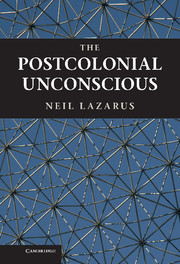Book contents
- Frontmatter
- Contents
- Acknowledgements
- Introduction: The political unconscious of postcolonial studies
- 1 The politics of postcolonial modernism
- 2 Fredric Jameson on ‘Third-World Literature’: a defence
- 3 ‘A figure glimpsed in a rear-view mirror’: the question of representation in ‘postcolonial’ fiction
- 4 Frantz Fanon after the ‘postcolonial prerogative’
- 5 The battle over Edward Said
- Notes
- Works cited
- Index
4 - Frantz Fanon after the ‘postcolonial prerogative’
Published online by Cambridge University Press: 05 June 2012
- Frontmatter
- Contents
- Acknowledgements
- Introduction: The political unconscious of postcolonial studies
- 1 The politics of postcolonial modernism
- 2 Fredric Jameson on ‘Third-World Literature’: a defence
- 3 ‘A figure glimpsed in a rear-view mirror’: the question of representation in ‘postcolonial’ fiction
- 4 Frantz Fanon after the ‘postcolonial prerogative’
- 5 The battle over Edward Said
- Notes
- Works cited
- Index
Summary
The work of Frantz Fanon served as a central node of focus, discussion, and dispute in the institutionalisation and consolidation of postcolonial studies during the 1980s and 1990s. This much is uncontroversial. Fanon's writings were typically granted a formative, stabilising status in the various readers published during those years, that aimed to set a theoretical and substantive agenda for the field and to provide it with an archive and a canon; and if the best-known surveys, primers, and introductions to the field tended to devote pride of place to individual chapters on Edward W. Said, Gayatri Chakravorty Spivak, and Homi K. Bhabha – the three critics whose publications they typically presented as field-defining – rather than to Fanon, they nevertheless all took time to acknowledge and explore the centrality of Fanon ‘beyond’ or ‘behind’ the emergent critical discussion. Scholars in the emergent field looked to Fanon as they looked to no other politico-intellectual active in the decolonising era. There was, to be sure, intermittent – in individual instances, sustained – discussion of such figures as James and Césaire and Senghor, Castro and Guevara, Nehru and Gandhi, Nkrumah, Nyerere, Nasser, and Cabral – even, if much more infrequently, Ho Chi Minh or Mao or Sukarno. But Fanon was the only figure from this era with whose work it was considered essential to be familiar. In this respect, Fanon was not first among equals.
- Type
- Chapter
- Information
- The Postcolonial Unconscious , pp. 161 - 182Publisher: Cambridge University PressPrint publication year: 2011



